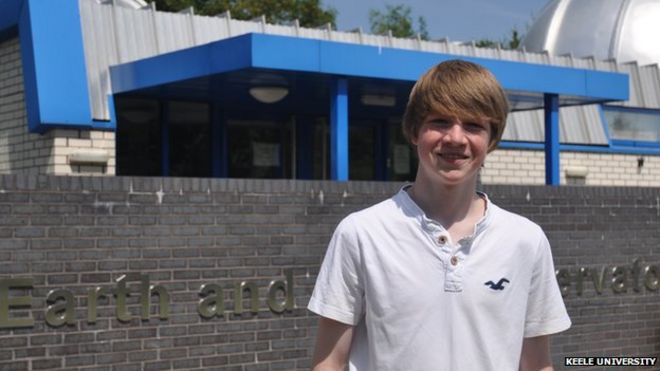RadishRose
SF VIP
- Location
- Connecticut, USA
This IS good news LynnD, thanks. Imagine, 30k tons of food formerly wasted, now going to hungry people.
Staffordshire schoolboy discovers new planet

Tom Wagg discovered the planet when he was 15
A planet 1000 light-years away has been found by a schoolboy from Staffordshire. Tom Wagg, 17, a student at Newcastle-under-Lyme School, said he was "hugely excited" by his discovery. He was 15-years-old when he spotted the planet while doing work experience at Keele University and it took two years to prove its existence.
The planet does not have a name yet and a competition has been launched to find one.
Keele University's Professor Coel Hellier said Tom looked through an archive of data for "good planet candidates".
He searched through images of the night sky looking for tiny dips in light caused by a planet passing in front of its star.
"We then had to do follow up observations using telescopes in Chile," Prof Hellier said. Scientists from Switzerland, France and Belgium were also involved.
Keele University is part of a nationwide collaboration of observatories called the Wide Angle Search for Planets (WASP). The planet was given the number WASP-142b, being the 142nd planet discovered by the WASP group.
What is the SKA?
The SKA radio telescope is an international project to build the world's largest radio telescope; consisting of thousands of antennas linked together by high bandwidth optical fibre.
The SKA will be 50 times as sensitive as the best existing radio telescopes and will have a survey speed 10,000 times faster than its nearest current-day rival—enabling it to carry out research more quickly than ever before. It aims to address fundamental questions about the evolution of the Universe including the formation of black holes, the origins of the first stars and the generation of magnetic fields in space.
The SKA program is being led by the international SKA Organisation [external link], a not-for-profit company with its headquarters in Manchester, UK.
The telescope will be implemented across two main sites: the Murchison region in Western Australia and southern Africa.
The SKA will be developed over a phase timeline; pre-construction development is underway and will continue through to the latter half of this decade, involving detailed design, implementation, R&D work, and contract preparation needed to bring the SKA's first phase to construction readiness.
The main bulk of the SKA will be built in two phases, with the first phase (SKA1) involving testing of the full system in a 'proof of concept' manner. As part of SKA1, Australia will host the SKA1-Low and SKA1-Survey components of the SKA. The 36 antennas of CSIRO's ASKAP telescope will be integrated into SKA1-Survey. The 64-dish MeerKAT SKA precursor in South Africa will be incorporated into the mid-frequency component of SKA1, built in South Africa.
http://www.atnf.csiro.au/projects/ska/index.html
| I must say I find television very educational. The minute somebody turns it on, I go to the library and read a good book. --Groucho Marx |


These passengers would be excused for causing a flap in the back of a cab.But thankfully, they were well behaved.
Checker Yellow Cab driver Urga Adunga is being heralded for saving a duck and her brood of nine ducklings stranded on a busy stretch of 16 Ave. near Shaganappi Tr. N.W., corralling them into the back of his cab and shepherding them to safety at the nearby Bow River.
“I jumped out of my cab and I motioned for the oncoming traffic to pull over so I could get the animals to safety,” he said in a statement.
“The ducks had nowhere to go in the construction confusion so I decided to scoop them up and put them in my cab.
“Several drivers got out of their cars and signalled everyone to stop.
“Other drivers used baby carriers to hold the ducklings and put them gently into my cab with their mama.”
Adunga said the mother duck sat quietly during the short trip, but wasn’t too keen on getting out.
After opening all the cab’s doors, Adunga said the mother duck remained on the seat, so he clapped his hands to shoo her out.
The babies were too small to make the jump, despite their mother’s insistant quacking, said Adunga, so he lifted them out and they rejoined their mother before waddling off to the river.
A smart lad finds a new planet.
The number of known planets keeps going up.
